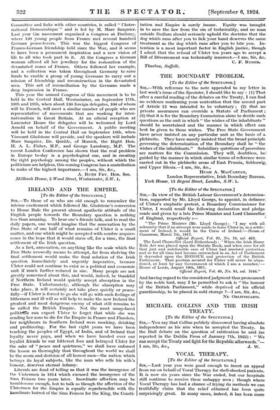IRELAND AND THE EMPIRE.
[To the Editor of the SPECTATOR.] SIR,—To those of us who are old enough to remember the intense excitement which followed Mr. Gladstone's conversion to Home Rule the present almost apathetic attitude of the English people towards the Boundary question is nothing less than amazing. To hear one's friends talk, and to read the daily papers, one would imagine that the annexation by the Free State of one half of what remains of Ulster is a small matter, and one which might be accepted with sombre acquies- cence in the hope that it would stave off, for a time, the final settlement of the Irish question.
As a fact, annexation, on anything like the scale which the Free State avowedly means to attempt, far from shelving the final settlement would make the final solution of the Irish question immediately and urgently imperative, because Ulster could not continue to exist as a political and economic unit if much further reduced in size. Many people are not greatly concerned about this, and would, indeed, be thankful if Northern Ireland would quietly accept absorption in the Free State. Unfortunately, although the absorption may take place, it will certainly not take place quietly or peace- fully—if Ulster is forced to go she will go with such feelings of bitterness and ill will as will help to make the new Ireland the greatest and most dangerous enemy of what still remains to be called the British Empire. Not the most smug-faced politieirm can expect Ulster to forget that while she was sending her sons to die for the Empire in France and Flanders, her neighbours in Southern Ireland were mocking, drinking and profiteering. For the last eight years we have been teaching the peoples of Egypt, of India, and of Ireland that loyalty never pays, and when we have handed over our loyalist friends to our bitterest foes and betrayed Ulster for the sake of " peace and quietness," we shall have enforced the lesson so thoroughly that throughout the world we shall be the scorn and derision of all honest men—the nation which betrays its loyal subjects, like the man who sells his wife's honour, deserves eternal infamy.
Liberals are fond of telling us that it was the insurgence of the Ulstermen in 1914 which excused the insurgence of the Sinn Feiners two years later. Inordinate affection may be troublesome enough, but to talk as though the affection of the Ulstermen for the Empire is equally reprehensible with the inordinate hatred of the Sinn Feiners for the King, the Consti- tution and Empire is surely insane. Equity was brought in to save the law from the sin of technicality, and no man. outside Bedlam should seriously uphold the doctrine that the dog which runs after you to lick your hand deserves the same treatment as the dog which runs after you to bite you. In- tention is a most important factor in English justice, though I admit that the refusal of Ulster ten years ago to accept a Bill of Divorcement was technically incorreet.—I am, Sits &c.
Thorium, Suffolk. C. F. RYDER.






































 Previous page
Previous page